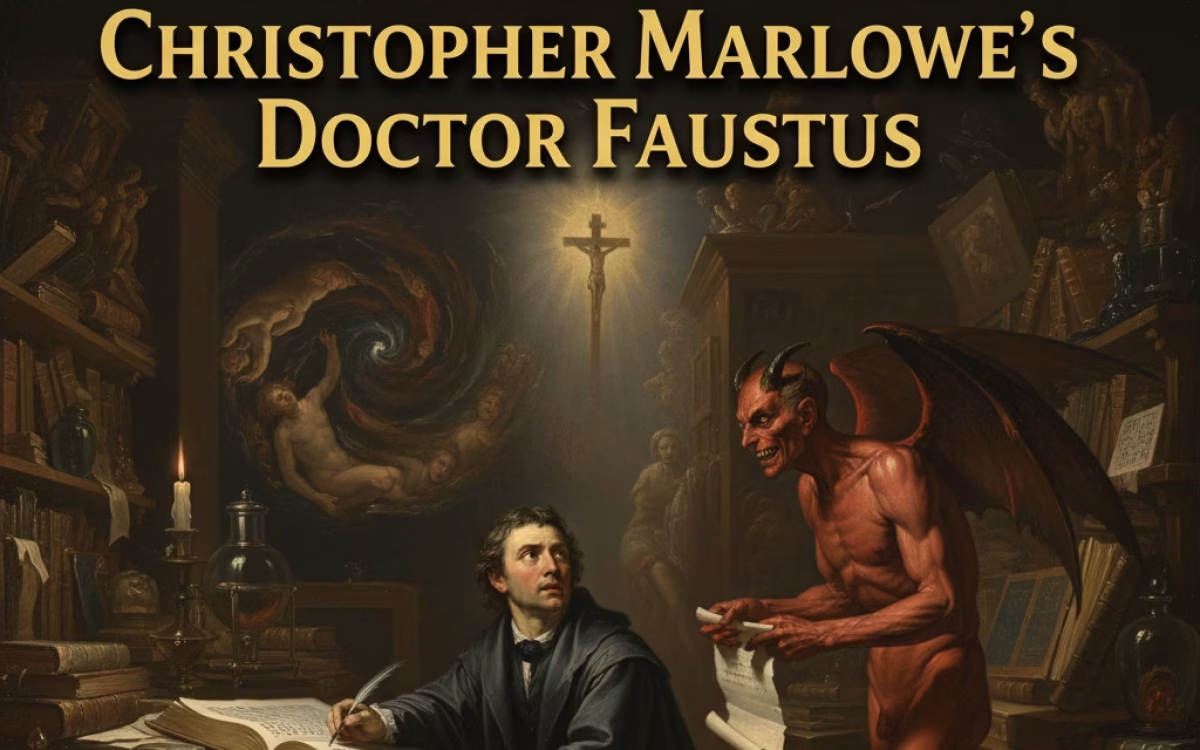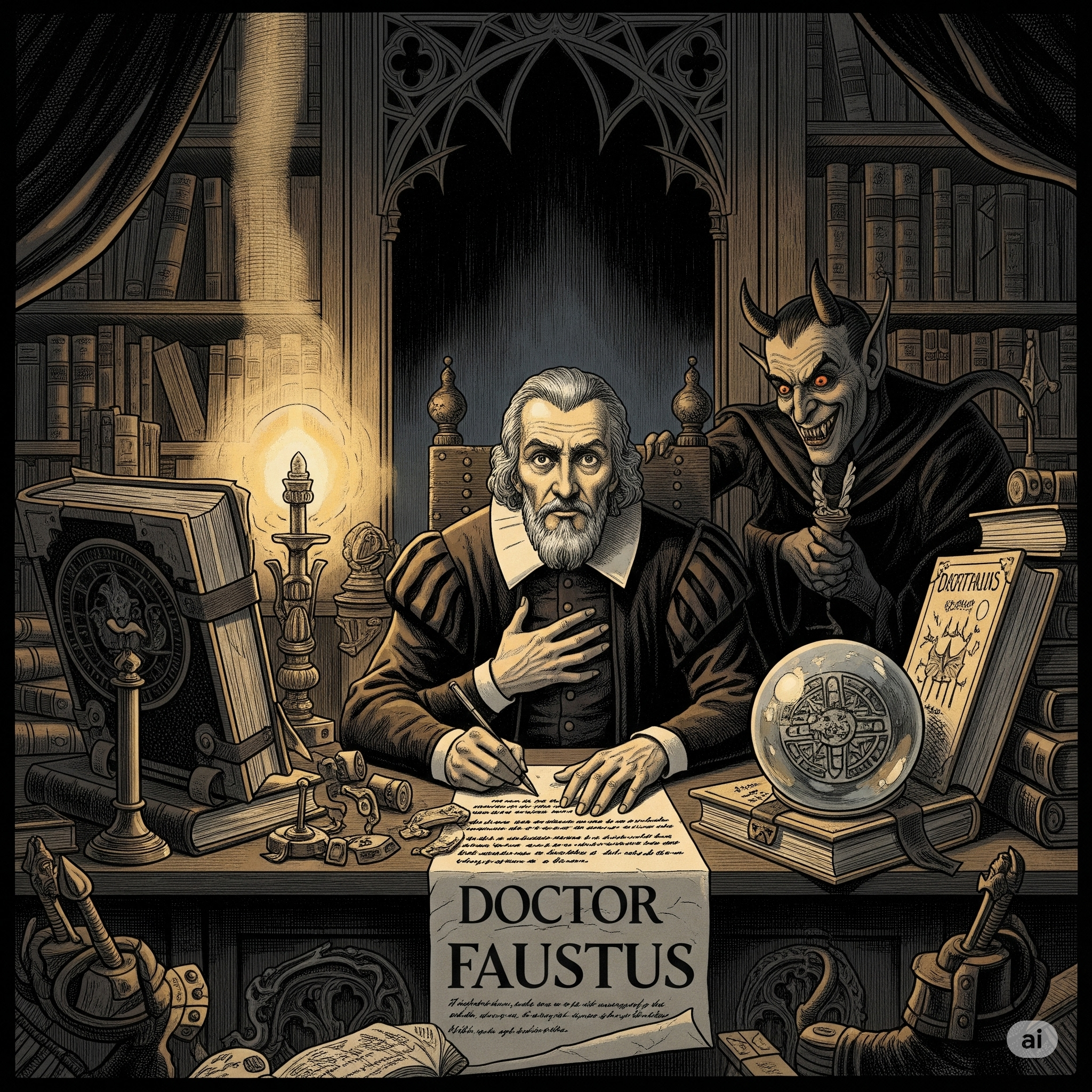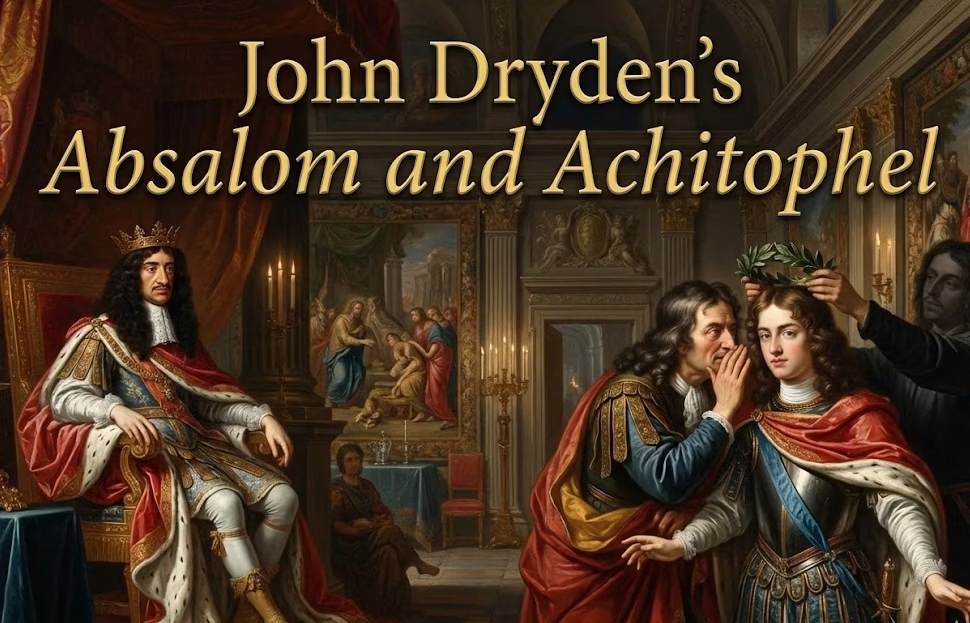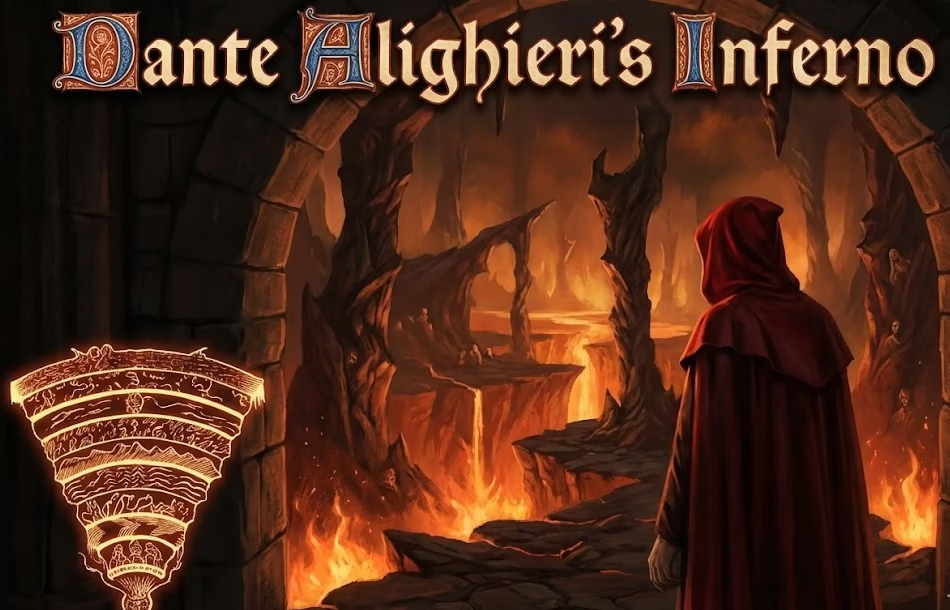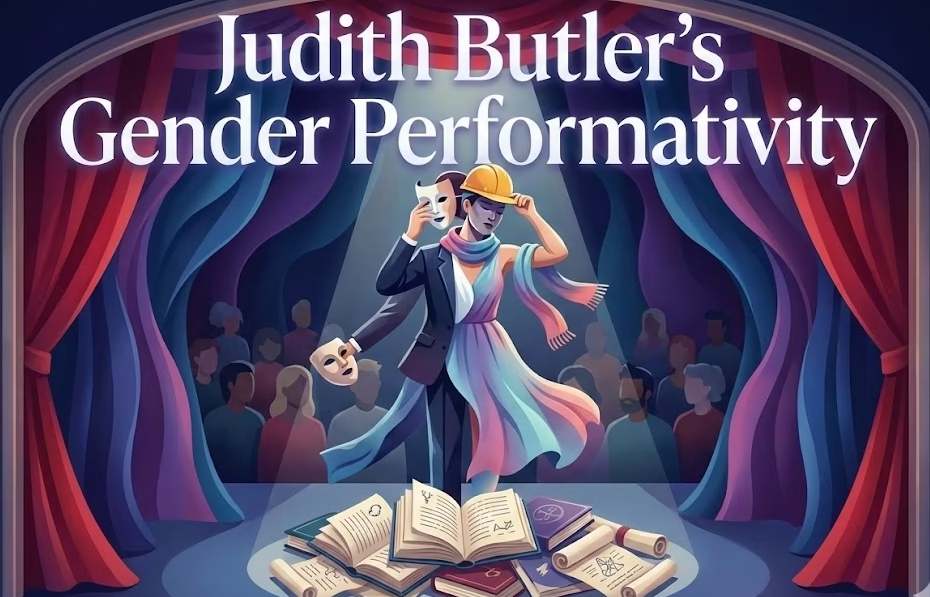Introduction
Why does Doctor Faustus by Christopher Marlowe continue to fascinate readers centuries after it was first performed? The answer lies in its universal themes—ambition, temptation, and the eternal struggle between good and evil. Marlowe’s masterful storytelling and poetic language bring to life a protagonist whose desires and downfall reflect the complexities of the human soul.
Doctor Faustus by Christopher Marlowe is a timeless tragedy that delves deep into the human desire for power, the allure of temptation, and the inescapable grip of fate. Written during the English Renaissance, this play remains a cornerstone of literature, captivating readers and audiences with its exploration of ambition, morality, and the consequences of our choices. In this comprehensive guide, we’ll unravel the plot, analyze key themes, examine major characters, and answer the most frequently asked questions about Doctor Faustus by Christopher Marlowe.
Plot Summary: The Tragic Journey of Doctor Faustus
Doctor Faustus by Christopher Marlowe follows the story of Dr. John Faustus, a brilliant but restless scholar at the University of Wittenberg. Despite his mastery of law, medicine, logic, and theology, Faustus feels unfulfilled. Craving more than what human knowledge can offer, he turns to necromancy—the forbidden art of magic.
With the help of his friends Valdes and Cornelius, Faustus summons Mephistophilis, a demon from Lucifer’s realm. In a moment of reckless ambition, Faustus strikes a deal: he will sell his soul to Lucifer in exchange for 24 years of unlimited knowledge and magical power, with Mephistophilis as his servant.
As Faustus embarks on his journey, he uses his newfound powers for both grand and petty purposes—summoning spirits, playing tricks on the Pope, and impressing royalty. However, his deeper aspirations remain unfulfilled. Despite repeated warnings from the Good Angel, the Old Man, and even Mephistophilis himself, Faustus cannot bring himself to repent. As the end of his contract approaches, Faustus is consumed by fear and regret. In the play’s harrowing climax, he is dragged to hell, his cries for mercy unanswered. READ MORE
Key Themes in Doctor Faustus by Christopher Marlowe
The Pursuit of Power and Knowledge
At its core, Doctor Faustus by Christopher Marlowe is a meditation on the human thirst for power. Faustus’s desire to transcend the limits of ordinary knowledge drives him to make a pact with the devil. This theme resonates with the spirit of the Renaissance, an era marked by exploration and the questioning of established truths. Yet, Marlowe warns that unchecked ambition can lead to self-destruction.
The Nature of Temptation
Temptation is ever-present in Doctor Faustus by Christopher Marlowe. Faustus is constantly torn between the voices urging him toward repentance and those luring him deeper into sin. The Bad Angel, the parade of the Seven Deadly Sins, and Mephistophilis all represent the seductive power of temptation. The play asks: can anyone truly resist temptation, or is it an inevitable part of the human experience?
Fate, Free Will, and Damnation
Is Faustus doomed from the start, or does he have the power to change his fate? Doctor Faustus by Christopher Marlowe explores the tension between predestination and free will. Despite being given multiple opportunities to repent, Faustus’s choices ultimately seal his fate. The play suggests that while fate may be powerful, our decisions carry immense weight.
The Cost of Ambition and Hubris
Faustus’s downfall is rooted in his pride—his belief that he can outwit both God and the devil. This tragic flaw, or hamartia, aligns him with the classic tragic hero. Marlowe uses Faustus’s story to caution against the dangers of arrogance and the relentless pursuit of personal glory at the expense of one’s soul.
The Search for Meaning
Despite his supernatural powers, Faustus remains unfulfilled. His journey is a poi
gnant commentary on the human search for meaning and satisfaction. The play invites readers to reflect on what truly brings happiness and whether the pursuit of power is worth the ultimate price.
Character Analysis: The Figures of Doctor Faustus by Christopher Marlowe
Dr. John Faustus
The protagonist of Doctor Faustus by Christopher Marlowe is a complex figure—intelligent, ambitious, and tragically flawed. Faustus’s journey from respected scholar to doomed soul is marked by moments of brilliance, doubt, and despair. His inability to repent, even when faced with the consequences of his actions, makes him one of literature’s most compelling tragic heroes.
Mephistophilis
Mephistophilis is both tempter and tragic figure. While he serves Lucifer and facilitates Faustus’s downfall, he also expresses regret for his own damnation. His relationship with Faustus is layered—at times adversarial, at times almost sympathetic. Mephistophilis’s warnings about the horrors of hell add depth to his character and underscore the play’s moral complexity.
The Good Angel and Bad Angel
These allegorical characters externalize Faustus’s internal struggle. The Good Angel urges him to repent and seek salvation, while the Bad Angel encourages him to pursue forbidden knowledge and pleasure. Their presence highlights the constant battle between conscience and desire.
The Old Man
The Old Man appears in the final act as a voice of hope and redemption. He pleads with Faustus to repent, offering a final chance at salvation. His unwavering faith contrasts with Faustus’s despair and serves as a reminder that redemption is always possible—if one chooses it.
Structure and Style: The Craft of Marlowe
Doctor Faustus by Christopher Marlowe is structured in five acts, blending elements of classical tragedy and medieval morality plays. Marlowe’s use of blank verse gives the dialogue a poetic rhythm, while his vivid imagery and rhetorical flourishes heighten the drama. The play’s comic scenes, often involving Faustus’s servant Wagner or the clowns Robin and Rafe, provide moments of levity and underscore the folly of Faustus’s choices.
Historical and Cultural Context
Written during the late 16th century, Doctor Faustus by Christopher Marlowe reflects the intellectual and religious upheavals of the Renaissance. The period was marked by a growing interest in science, exploration, and individual achievement, but also by anxiety about the limits of human ambition. The story of Faustus, based on German legend, resonated with audiences who saw in it both the promise and peril of the new age. FOR MORE INFORMATION
The Enduring Legacy of Doctor Faustus by Christopher Marlowe
Why does Doctor Faustus by Christopher Marlowe remain relevant today? Its exploration of ambition, temptation, and the consequences of our choices speaks to universal human experiences. The play has inspired countless adaptations, from stage productions to films and novels. Its influence can be seen in works ranging from Goethe’s Faust to modern retellings in popular culture.
The character of Faustus has become an archetype—the overreacher whose desire for more leads to his undoing. Marlowe’s play continues to challenge and captivate, inviting each new generation to grapple with its timeless questions.
Modern Relevance: Lessons from Doctor Faustus by Christopher Marlowe
In an age obsessed with achievement and self-fulfillment, the lessons of Doctor Faustus by Christopher Marlowe are more relevant than ever. The play asks us to consider the cost of our ambitions and the importance of humility, self-awareness, and ethical boundaries. It reminds us that the pursuit of power, without regard for morality, can lead to emptiness and regret.
Conclusion: The Power and Tragedy of Doctor Faustus by Christopher Marlowe
Doctor Faustus by Christopher Marlowe is more than a cautionary tale—it’s a profound exploration of what it means to be human. Through Faustus’s rise and fall, Marlowe invites us to reflect on our own desires, choices, and the boundaries we dare to cross. The play’s enduring power lies in its ability to speak to the deepest questions of ambition, temptation, and fate. EXPLORE MORE
Frequently Asked Questions (FAQs)
Q1: What is the main message of Doctor Faustus by Christopher Marlowe?
A1: The play warns against unchecked ambition and the pursuit of power at the expense of one’s soul. It emphasizes the importance of humility, repentance, and moral responsibility.
Q2: Is Doctor Faustus a tragic hero?
A2: Yes, Faustus is considered a classic tragic hero. His intelligence and ambition are admirable, but his pride and inability to repent lead to his downfall.
Q3: What role does Mephistophilis play in the story?
A3: Mephistophilis is both a tempter and a complex character who expresses regret for his own damnation. He facilitates Faustus’s pact and ultimately ensures his damnation.
Q4: How does the play address the theme of free will versus fate?
A4: The play explores whether Faustus is doomed from the start or if he has the power to change his fate. Despite opportunities for repentance, Faustus’s choices lead to his tragic end.
Q5: Why is Doctor Faustus by Christopher Marlowe still studied today?
A5: The play’s exploration of timeless themes—ambition, temptation, morality, and the human condition—ensures its continued relevance. Its rich language and complex characters make it a favorite in literature and theatre studies.

